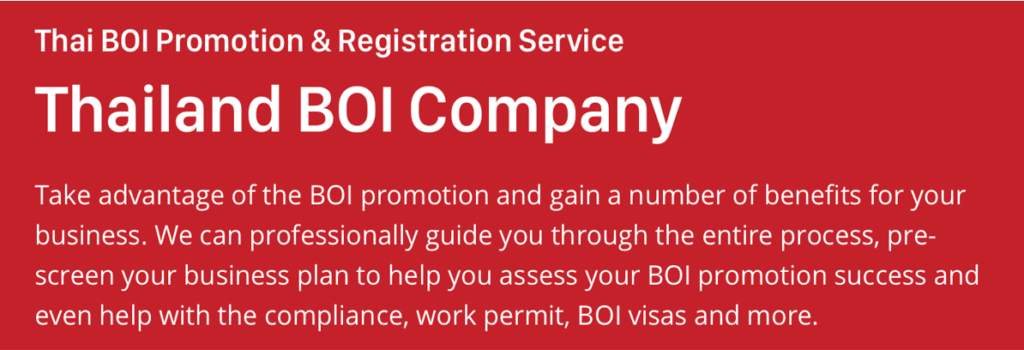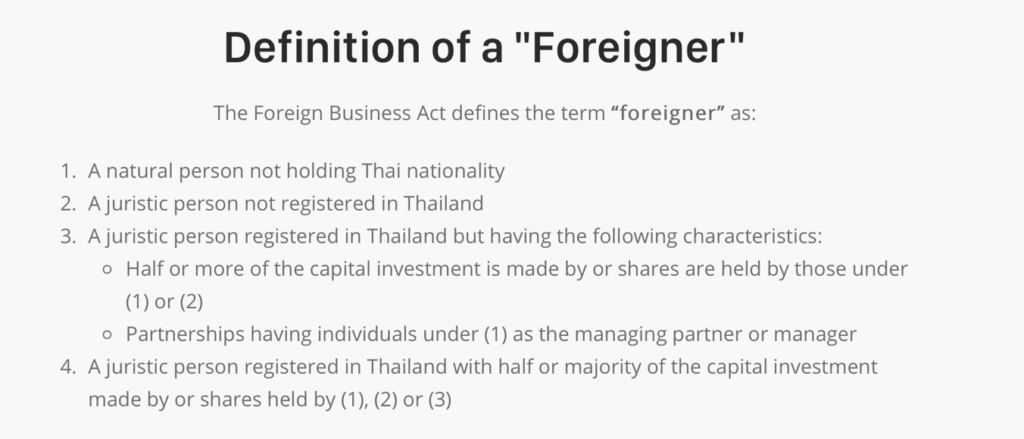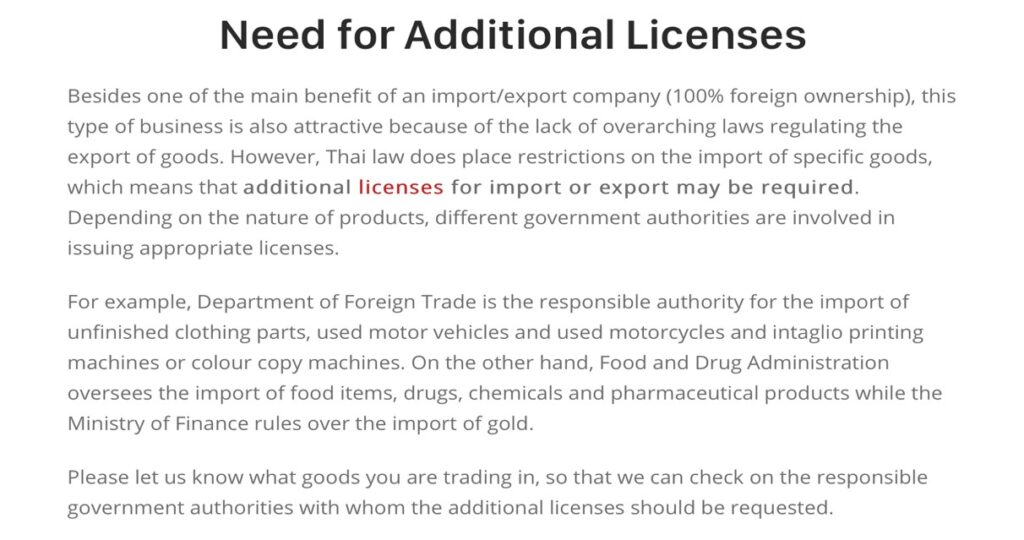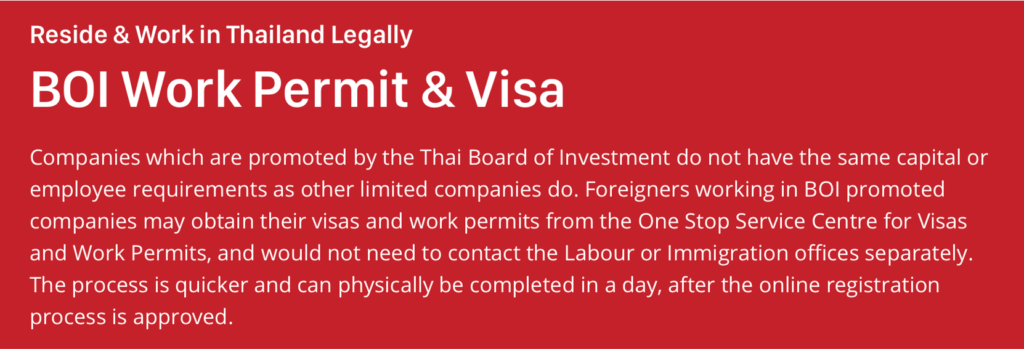Consulting Service
Consulting Service
( Company Registration, BOI Registration, Foreign License, Export/Import License, Work Permit)
If your new business in Thailand is likely to provide substantial economic benefits to Thailand, you may be eligible to register your business as foreign owned with the Board of Investment (BOI). Subject to meeting the criteria of the Board, there are incentives and privileges attached to a company formed in this way. If you believe that your business might fall into this category, we will be happy to advise and guide you through the process.
1. Company Registration
5 Simple Steps For Company Registration In Thailand

Step 1
Reservation of the Name
The company’s name should not be similar to any other Thai companies. The Business Development Office’s guidelines assist in deciding a name for your company. However, the approved name will be valid for thirty days without any extension.
Step 2
Memorandum of Association
The document should include reserved name of the company, its business objectives, name of the promoter, the province where the company will be situated and the capital for registration. The Memorandum of Association is typically filed with the Business Development Office. The capital should include the par value alongside the number of shares. Nevertheless, the authorized capital is partly paid, but it must be issued fully. Even though, there isn’t any minimum capital requirement, it should be at least sufficient for the business operation
Step 3
The Statutory Meet
Upon elaborating the share structure, a statutory meeting is convened, wherein the articles of incorporation are approved. Also, the Board of Directors is decided. Further, it is confirmed that 25% of the par value of the subscribed share is paid.
Step 4
Company Registration
The directors should submit their company’s establishment application within the three months of the Statutory Meeting. As for the fees, the amount for company registration is 500 baht each 100,000 baht of the registered capital. However, the minimum fee is 5,000 baht, where the maximum is up to 250,000 baht.
Step 5
Tax Registration
Businesses should obtain their tax I.D. card as well as the number for the company within sixty days of the incorporation from the Thai Revenue Department. Companies earning 600,000 baht or more per annum should register for VAT

2. BOI Registriation


BOI Tax & Non Tax Incentives
Tax Incentives :
– Exemption/reduction of import duties on machinery (Section28/29)
– Reduction of import duties for raw or essential materials (Section 30)
– Exemption of corporate income tax on the net profit and dividends derived from the promoted activity (Section 31 and 34)
– A 50 percent reduction of the corporate income tax (Section 35(1))
– Double deduction from the costs of transportation, electricity and water supply (Section35(2))
– Additional 25 percent deduction of the cost of installation or construction of facilities (Section35(3))
– Exemption of import duty on raw or essential materials imported for use in production for export (Section 36)
TEST Reports :
– Permit for foreign nationals to enter the Kingdom for the purpose of studying investment opportunities. (Section 24)
– Permit to bring into the Kingdom skilled workers and experts to work in investment promoted activities (Section 25 and 26)
– Permit to own land (Section 27)
– Permit to take out or remit money abroad in foreign currency (Section 37)
3.Foringner Business Licnese (FBL)


How Thai Law Separates Foreigners?
Non-registered juristic person in Thailand
Registered juristic person in Thailand having the following characteristics;
Limited company, where almost 50% of the capital shares are held by the foreigner(s)
Limited partnership, where 50% of the capital is invested by the foreigner(s)
Limited partnership, where a foreigner is the managing partner/manager
Thai FBL Terms & Conditions
The Applicant,
- Must have attained the age of 20
- Must not be a bankrupt
- Must not be an incompetent
- Have a residency or should be permitted to enter Thailand temporarily
- Never had a revoked license under Notification No. 281
- Never found guilty by the court or fined for an offence
- Never have been imprisoned for debtor cheating and fraudulent acts
- Never being bankrup
4. Business License Application
Business License Application in Thailand
A Thai foreign business license allows foreigners to conduct as well as manage businesses limited to foreign nationals under Thai law.
5. Improt / Export certificate
Points to Remember about Thai Import/Export License
- An import/export license or customs card is valid for 3 years;
- Online brokers receive a golden card, whereas owners and managers get a yellow card and lawyer receives a green card;
- The import/export clearance card is pink for all.


Some Important Import and Export Laws and Rules
- Selling rice abroad is illegal;
- A foreign buyer may be allowed to trade timber, rubber, scrap, silk, and animal skins, but in exchange for taxes at their expense.
- One must obtain license from the government to trade gold, livestock, or sugar;
- There are almost 50 categories of goods that need an import license and they are frequently modified by the Ministry;
- Importation of any pharmaceutical products requires a Food and Drug Administration authorization;
- To ship works of art, historical exhibits, and antiques one need authorization from the Director General of Fine Arts; so on and so forth;
6. Work PermitApplication
What Is A Thai Work Permit?
According to the Thai law, foreigners working in Thailand must obtain work permit. It can only be done after applying to the Ministry of Labour, Bangkok.
Documents to be submitted by the Employee
- Self-attested copies of passport
- Three recent photos (5 x 6 centimeters) wearing business attire
- CV or resume, stating the applicant’s experience in detail
- Letter of employment
- Non-immigrant visa
- Self-attested education degree
- Self-attested certificates or license
- Departure card TM.6
- Transcript
- Original marriage certificate along with its signed photocopy, wife’s ID, household registration and birth certificates of children (if married to a Thai National)
Documents to be submitted by the Employee
- Self-attested copies of passport
- Three recent photos (5 x 6 centimeters) wearing business attire
- CV or resume, stating the applicant’s experience in detail
- Letter of employment
- Non-immigrant visa
- Self-attested education degree
- Self-attested certificates or license
- Departure card TM.6
- Transcript
- Original marriage certificate along with its signed photocopy, wife’s ID, household registration and birth certificates of children (if married to a Thai National)
Responsibilities of an Expat after Getting a Thailand Work Permit
- The work permit must be carried to work so that it can be shown to the government officials any time.
- The licensee must do only those works stated in the work permit. Also, he/she must work in the workplace and locality defined in the work permit in Thailand.
- The licensee must notify the registrar within 30 days from the extension date.
- The licensee who wants to continue working must make an application for the renewal of work permit before its expiry.
- If the contract with the present company has been terminated, it is the licensee’s duty to notify the Department of Employment plus return the work permit within seven days from termination date.
- Additionally, the employer must notify the Department of Employment in 15 days from the termination date.
Who All Don’t Need a Work Permit?
- Members of the consular missions
- Individuals having special permission from the Thai government
- Representatives of member countries
- Individuals who are on missions under the agreement between foreign government and Thai government

